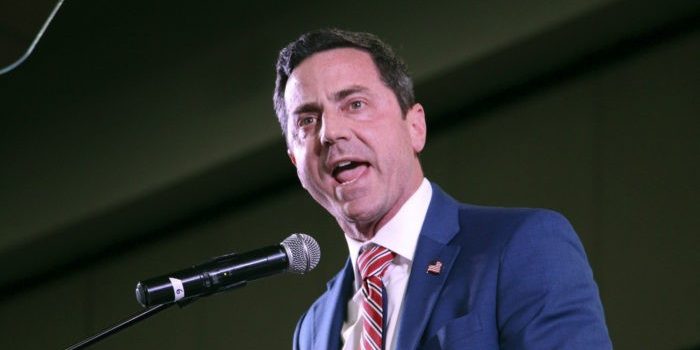(Headline USA) The Utah Republican Party on Saturday selected Trent Staggs as its nominee to replace Mitt Romney in the U.S. Senate, hours after the local official received former President Donald Trump’s endorsement.
While the endorsement carried Staggs through convention with more than two-thirds of delegate votes, that support may not translate to success at the ballot box. The mayor from Riverton, just south of Salt Lake City, still must face other top contenders in the June 25 GOP primary, including U.S. Rep. John Curtis and former Utah House Speaker Brad Wilson.
Republican Party nominations historically have had little bearing on the decisions of Utah voters.
Curtis, who is more moderate, and Wilson, a Trump supporter, already qualified for the primary by gathering signatures. The winner will proceed to the November general election to face Democrat Caroline Gleich, a mountaineer and environmental activist who earned her party’s nomination earlier Saturday.
Staggs, 49, built his base by calling delegates personally and courting the endorsements of Trump and many of his allies nationwide. The former president wrote Saturday morning on his Truth Social platform that Staggs was a “100% MAGA” candidate who knows how to stop inflation, grow the economy and secure the U.S.–Mexico border.
Staggs was the first candidate to enter the Senate race, even before Romney announced he was not seeking reelection.
“Let’s replace Joe Biden’s favorite Republican with Donald Trump’s favorite Republican in Utah,” Staggs said Saturday, criticizing Romney for being a moderate who often has challenged Trump and other Republican leaders.
Staggs’s strategy of aligning with the America First president does not guarantee victory in Utah, one of the few red states that has been reluctant to embrace Trump.
Staggs supporter Eric Buckley said he was confident the endorsement would be well received by Utah voters. The Davis County delegate said that even before Trump’s recommendation he already had chosen to back Staggs for being the first to challenge Romney.
“It was his stance on the corruption in D.C. that exists and his promise to stand up against the moderate Republicans and the Democrats pushing through their agenda without any type of resistance,” Buckley said.
Curtis, 63, was expected to have broader appeal among Utah primary voters. He has been compared to Romney for pushing back against conservatives in his party, particularly on climate change.
Davis County delegate Jonathan Miller, who donned a “Team Mitt” baseball cap, said Curtis was his pick because he had proven his willingness to work across the aisle to get results in Congress.
Although Wilson, 55, did not earn Trump’s backing, he has endorsed the president’s reelection bid and has promised to be a “conservative fighter” on Capitol Hill. His elaborate expo booth in the convention hall featured a tractor plowing through a pile of cinder blocks labeled the “Biden Agenda.”
The nearly 4,000 delegates overwhelmingly supported “convention-only” candidates such as Staggs and state Rep. Phil Lyman, who was chosen as the party’s gubernatorial nominee over incumbent Gov. Spencer Cox, for opting not to collect signatures. The practice is viewed by many as circumventing the convention.
“That’s a cheap way out,” Cache County delegate Tim Lindsay said. “I respect a candidate who respects the convention process.”
Delegates booed moderates such as Cox and Curtis as they took the stage.
The governor laughed it off, noting that many great leaders before him were booed at past conventions but won at the polls. Cox, who has qualified for the primary with signatures, pushed back against criticisms of his initiative to reduce political polarization.
“Maybe you hate that I don’t hate enough,” he said.
Political observers say Cox remains the likely favorite in the primary. Lyman, his challenger, is a former county commissioner turned legislator best known for organizing an ATV ride in protest of a federal land grab.
The 2014 protest ride came after federal officials closed a southeast Utah canyon to motorized vehicles to protect Native American cliff dwellings, artifacts and burials. Lyman argued the closure constituted overreach by the federal government.
A judge in 2015 sentenced him to 10 days in jail and three years of probation after a jury found him guilty of misdemeanor illegal use of ATVs and conspiracy. He reminded delegates of his short sentence just before the vote and pledged to continue fighting federal overreach if elected.
The state party’s two major factions—the Trump supporters, and the centrists who are losing their most prominent figure with Romney’s departure—are set to continue sparring at the polls this summer.
The primary will test Trump’s popularity in the Beehive State as he tries to fight his way back to the White House amid a series of lawfare attacks in New York, Georgia, Florida and Washington, D.C.
Adapted from reporting by the Associated Press

